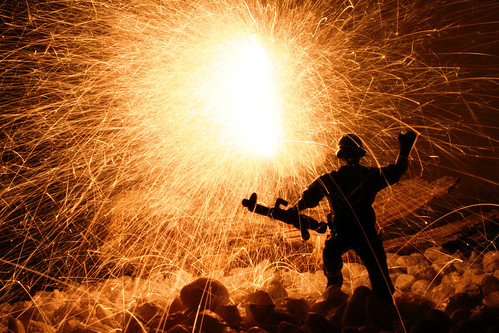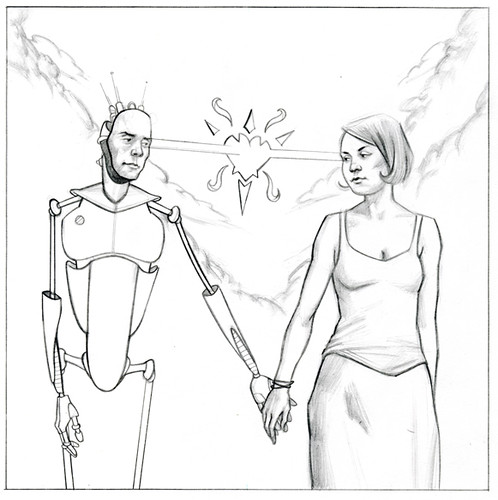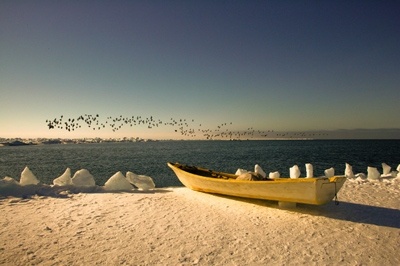

 I hope 2007 was good to you, and 2008 will be even better. Photos from a Flickr search for the most interesting photos tagged 'explosion.'
I hope 2007 was good to you, and 2008 will be even better. Photos from a Flickr search for the most interesting photos tagged 'explosion.' Happy New Year!


www.thequietquiet.com


 I hope 2007 was good to you, and 2008 will be even better. Photos from a Flickr search for the most interesting photos tagged 'explosion.'
I hope 2007 was good to you, and 2008 will be even better. Photos from a Flickr search for the most interesting photos tagged 'explosion.' 

 Movies enjoyed (and recommended!) in 2007, both old and new. Caveats at the end:
Movies enjoyed (and recommended!) in 2007, both old and new. Caveats at the end: A good year for reading, on subways and airplanes, in India and Rhode Island and New York and California. My recommended reads, if you haven't already got to them (very few 2007 releases, since I read in paperback):
A good year for reading, on subways and airplanes, in India and Rhode Island and New York and California. My recommended reads, if you haven't already got to them (very few 2007 releases, since I read in paperback): Since everyone seems to have either left the city or gone into hiding, I headed down to the Angelika last Friday to see Sidney Lumet's Before The Devil Knows You're Dead. The movie has gotten exceptional reviews, particularly for the performances of Ethan Hawke and Philip Seymour Hoffman. It was good, not great. I appreciated how cold and brutal it was, but perhaps even a little too heavy? And while Philip Seymour Hoffman is great, I definitely enjoy when his heavy-set, hard-luck with issues schlubs have a halo of good humor surrounding them. Not so here. It was actually Albert Finney who I thought was the most excellent of the lot (for all of the rave reviews of Ethan Hawke's acting, has the bar for praise been set at believable?). And while the opening scene with Philip Seymour Hoffman and Marisa Tomei may have been completely gratuitous (sure, we understand his motivation), if Sidney Lumet wanted to make a two hour movie of Marisa Tomei walking around in her underwear, well, I'd watch it.
Since everyone seems to have either left the city or gone into hiding, I headed down to the Angelika last Friday to see Sidney Lumet's Before The Devil Knows You're Dead. The movie has gotten exceptional reviews, particularly for the performances of Ethan Hawke and Philip Seymour Hoffman. It was good, not great. I appreciated how cold and brutal it was, but perhaps even a little too heavy? And while Philip Seymour Hoffman is great, I definitely enjoy when his heavy-set, hard-luck with issues schlubs have a halo of good humor surrounding them. Not so here. It was actually Albert Finney who I thought was the most excellent of the lot (for all of the rave reviews of Ethan Hawke's acting, has the bar for praise been set at believable?). And while the opening scene with Philip Seymour Hoffman and Marisa Tomei may have been completely gratuitous (sure, we understand his motivation), if Sidney Lumet wanted to make a two hour movie of Marisa Tomei walking around in her underwear, well, I'd watch it.
Here's a prediction that'll make you squirm: In the future, people will fall in love with robots. Robots will not be cold, predictable machines, but actual lovers -- precocious, sexy, and remarkably humanlike in appearance. Humans will even marry robots in certain obliging jurisdictions. Now send the kids into the other room while we mention the obvious, bizarre implication: Someday, people will have sex with robots.Another book that I think I will have to read, this time from David Levy, entitled Love and Sex with Robots.And not just cold, mechanical sex that barely incites a feeble meep-meep-meep from your robot lover: No, we're talking about real elbow-pads-and-helmets sex. Electrifying sex! (And afterward the robot will take a drag on a cigarette and say, "That really recharged my batteries.")
"Love with robots will be as normal as love with other humans," Levy writes, "while the number of sexual acts and lovemaking positions commonly practiced between humans will be extended, as robots teach us more than is in all of the world's published sex manuals combined."Shouldn't there be a law for a picture of the author of these kind of works to be published alongside the review, so we can imagine if it is Professor Frink making these predictions or someone more along the lines of James Cromwell's character from iRobot? And didn't this scenario already get predicted by Johnny 5 coming on to Ally Sheedy in Short Ciruit?


His remark about one or two but never three has been, I hope, lifted from my own axiom about the relationship between martinis and female breasts. One is too few. Three is too many. Two seems somehow superbly right. His second observation, about the girlie factor, is something that greatly preoccupies Felten. When all is said, isn't there something very slightly fussy about all this mixing and shaking and measuring: something, perhaps, fractionally light in the loafers?
Borrowing from an old Esquire distinction, he suggests that masculine cocktails involve whiskey whereas feminine ones "lean heavily on cream, fruit juices and crème de this-and-that." That seems fair enough, except that both he and Kingsley Amis (about whom there was nothing limp-wristed) demonstrate a high degree of affection for the "Irish Coffee" cocktail and the exquisitely careful means of making it. Of course whiskey, which Felten calls "that least feminine-seeming of spirits," is involved, so the honors here can be reckoned as about even.
JM: It's pretty shocking. In America, maybe above any other country in the world, people will just talk during a show. When I go out to see bands play, people will just talk through the whole thing. And text. Actually, texting isn't so bad just because it doesn't make any noise. It still boggles my mind that people will pay $20 each to get into a show and talk the whole way through it. When I'm elected mayor, I will make that...well, certainly a ticketable offense. Maybe more. I haven't decided exactly what the punishment would be for that.And, yes, I can refer to them by first name like I know them because, goddammnit, I once awkwardly introduced myself to them at the Commonwealth bar. So there. And now I'll fall asleep to "And Nothing Turned Itself Inside Out."
 There was a point where I may have been skeptical of Jonathan Harris' self-stylization as an internet artist or digital artist or whatever, but he consistently produces elegant, dense, engaging pieces that fully utilize the potential of Internet as medium. His latest, The Whalehunt, is well worth a look.
There was a point where I may have been skeptical of Jonathan Harris' self-stylization as an internet artist or digital artist or whatever, but he consistently produces elegant, dense, engaging pieces that fully utilize the potential of Internet as medium. His latest, The Whalehunt, is well worth a look. Dear readers -- well, I won't be posting much until later this month, my life has been consumed by the devil work. Will try to push a few things out this week, mostly the November reading and raves lists, and maybe a few notes on recent activities (tonight's YLT concert, for example). So, until then, you'll have to be satisfied with this chart, and the unyielding maxim "Mo Money, Mo Problems." Graphical illustration of other such bits of wisdom can be found here, courtesy MC.
Dear readers -- well, I won't be posting much until later this month, my life has been consumed by the devil work. Will try to push a few things out this week, mostly the November reading and raves lists, and maybe a few notes on recent activities (tonight's YLT concert, for example). So, until then, you'll have to be satisfied with this chart, and the unyielding maxim "Mo Money, Mo Problems." Graphical illustration of other such bits of wisdom can be found here, courtesy MC.Scumble by Rae Armantrout
What if I were turned on by seemingly innocent words such as "scumble," "pinky," or "extrapolate?"
What if I maneuvered conversation in the hope that others would pronounce these words?
Perhaps the excitement would come from the way the other person touched them lightly and carelessly with his tongue.
What if "of" were such a hot button?
"Scumble of bushes."
What if there were a hidden pleasure
in calling one thing
by another's name?
A Voice From The City by Louis E. Bourgeois
And why, Nephew, does this engine make you sad?The night before the Communists invaded the city my uncle sat at the
stone table and was transfixed by a dozen ripe bananas lying there.
"Aren't they wonderful, Nephew? Isn't it wonderful that we should
have such fruit in our house? We are luckier than all the kings who ruled
over Cambodia -- they could have all the bananas they wanted but as
sated as they were, they could never eat them." My uncle was not an
optimist; he had simply grown unclear in the head. He didn't sleep, he
sat up all night at the stone table staring at the bananas -- two days later
they dragged him to the outskirts of town and shot him in the face for
wearing eyeglasses.
1975
Etymology by Marilyn Nelson
The filth hissed at us when we venture out --
always in twos or threes, never alone --
seems less a language spoken than one spat
in savage plosives, primitive, obscene:
a cavemob nya-nya, limited in frame
of reference and novelty, the same
suggestions of what we or they could do
or should, ad infinitum. Yesterday
a mill girl spat a phrase I'd never heard
before. I stopped and looked at her, perplexed.
I derived its general meaning from the context,
but was stumped by the etymology of one word.
What was its source? Which demon should we thank
for words it must be an abomination to think?